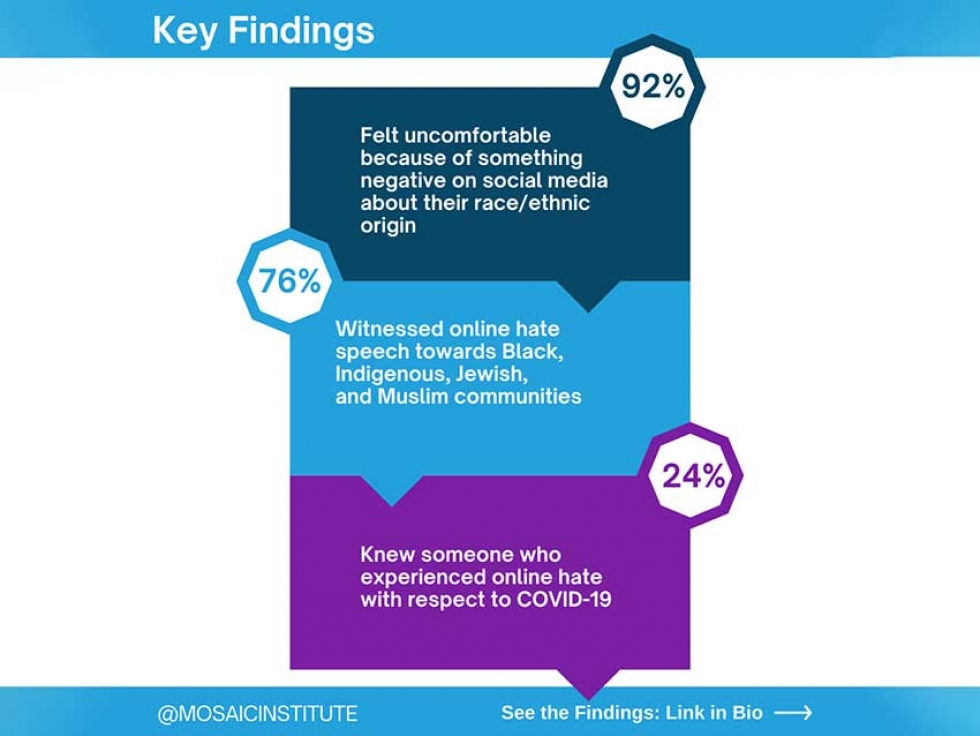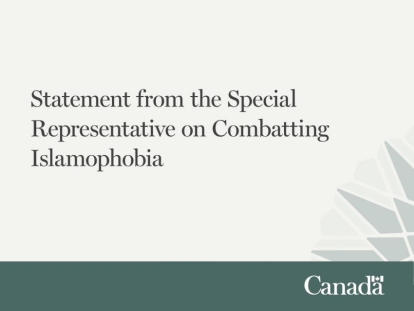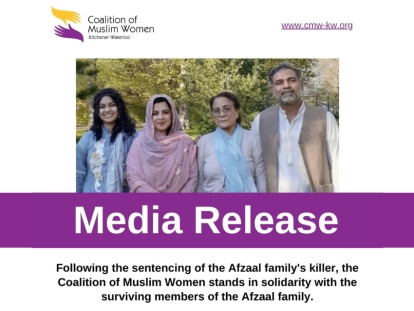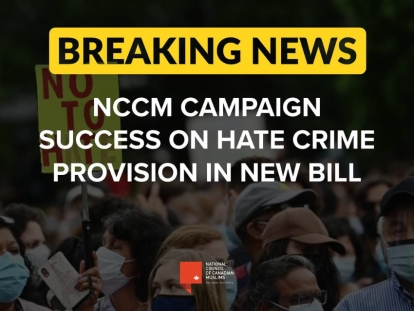
Feb
The Mosaic Institute Presents its Key Findings from Research on the Impact of Online Hate on Ontario Communities
Written by The Mosaic InstituteToronto – 8 February 2021
The Mosaic Institute was founded on a simple but powerful article of faith: that we are all stronger, wiser, and better together, not in spite of our differences, but precisely because of our differences. Yet, while our country and our province have been quick to hold up this creed in words, there is no denying that we have sometimes struggled to embrace it in deeds.
In our recent research on how people in Ontario experience online hate, 92% of respondents said they have felt uncomfortable because of something negative on social media about their race and/or their ethnic origin. Furthermore, 76% have witnessed online hate speech towards the Black, Indigenous, Jewish, or Muslim communities. Almost 20% had sought mental health support because of harmful or hateful content they experienced via the internet.
Mosaic’s work has always been built on rigorous, impartial, public research and engagement. We believe that the most direct path to successful societies is one that follows the truth, wherever it may lead and no matter how discomfiting the journey might be.
The coronavirus pandemic has thrown this tension into stark relief, with 24% of respondents knowing someone who had experienced online hate with respect to COVID-19.
“On the one hand, the impact of the pandemic is a powerful reminder that our interests as individuals are inextricably entwined with the health and prosperity of every other human being,” says Akaash Maharaj, CEO of The Mosaic Institute. “On the other hand, the highly uneven distribution of insecurity and suffering caused by the virus has exposed societal inequities with a brutal candour that fine words cannot soothe. This is an apt moment for us to look into ourselves, to ask difficult but essential questions about the reality of online hate in our province, the extent to which we are living up to our creed of inclusion, and what steps we must take where we are falling short.”
People surveyed generally agree that social media posts promoting physical violence against Black, Indigenous, Jewish, and Muslim communities are increasing. “It could never happen here” is a comforting self-deception we often tell ourselves, to feel superior to justify averting our eyes from our own societies’ evils.
The past four years have stripped Americans of their illusions. But they have also caused too many Canadians to clasp our own illusions still more tightly to our chests.
“Racial and ethnic plurality are at the heart of what it means to be Canadian. We are unquestionably one of the most diverse countries in history. Whether we are an inclusive country is the question of our time,” says Maharaj. “Arguably, our national mission is to build a country where every person enjoys an equal share of human dignity, where we recognize that we are stronger together not in spite of our differences, but precisely because of those differences. But there is a world of difference between a national aspiration and a national mythology.”
As Ontarians and Canadians, we can certainly take pride in the province and country we have built together. But just as certainly, we deceive ourselves if we believe that our task is complete, or our success is assured. We have come far. We have far to go. We hope this research will help us chart the path.
The final report, including data tables, intersectional analysis, and policy recommendations, will be released in Spring 2021.
About the Survey
Between February and August 2020, The Mosaic Institute conducted Through Our Eyes: Understanding the Impact of Online Hate on Ontario Communities (“The Project”), an original research project designed as an opportunity for Ontarians to express their experiences with online hate.
The Project studies how different communities in Ontario experience social media content in general, and their experience with online hate on these channels. This research has a special focus on communities whose physical safety is at risk and who experience hate crimes disproportionately, including Black, Indigenous, Jewish, and Muslim communities.
About the Mosaic Institute
The Mosaic Institute is a think-and-do tank which brings together people, communities, and nations to advance pluralism and reduce conflict. A charitable not-for-profit organization founded in 2007, we are a national platform operating through Track II diplomacy; people-to-people engagement to foster mutual understanding and to create strategies for peaceful coexistence.
We believe that Canada's diversity is not a problem to be solved, but rather the solution to many of Canada's and the world's conflicts. Our work is built on a foundation of rigorous, impartial, public research and we believe that the shortest path to peaceful solutions is the one that follows truth.


